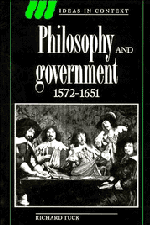4 - The alternatives
Published online by Cambridge University Press: 05 July 2011
Summary
ITALIAN AND GERMAN CRITICS OF THE TACITISTS
Just as the humanism of the Renaissance Ciceronians had affected the whole of sixteenth-century intellectual life, with even men fundamentally loyal to the scholastic traditions (such as the Spanish Dominicans discussed below) being obliged to take account of it in their own work, so the new humanism of the Tacitists penetrated all areas of thought. But it occasioned far more open and continued hostility than Ciceronianism had done, for obvious reasons; and in this chapter I shall consider the ways in which that hostility was articulated, and how anti-Tacitist ideas developed in the early seventeenth century. Broadly speaking, there were two ways in which people who sympathised with orthodox Aristotelian or Ciceronian values could handle the new humanism. One was to locate it within a familiar framework and thereby defuse it, while the other was straightforwardly to denounce it as incompatible with the values which earlier humanists had securely established. Again broadly, Italian and German writers tended to favour the former approach, and Netherlands writers the latter; Jesuit writers usually followed the Netherlanders rather than the Italians (as indeed they did in many other respects – witness the influence of the Louvain theologians on Jesuit theology).
A continuous feature of the intellectual situation which made some engagement with Tacitism inevitable was the fact that the most influential classical scholars of the day were men like Lipsius: a high degree of technical competence and theoretical sophistication gave them a general authority within the study of the classics.
- Type
- Chapter
- Information
- Philosophy and Government 1572–1651 , pp. 120 - 153Publisher: Cambridge University PressPrint publication year: 1993

